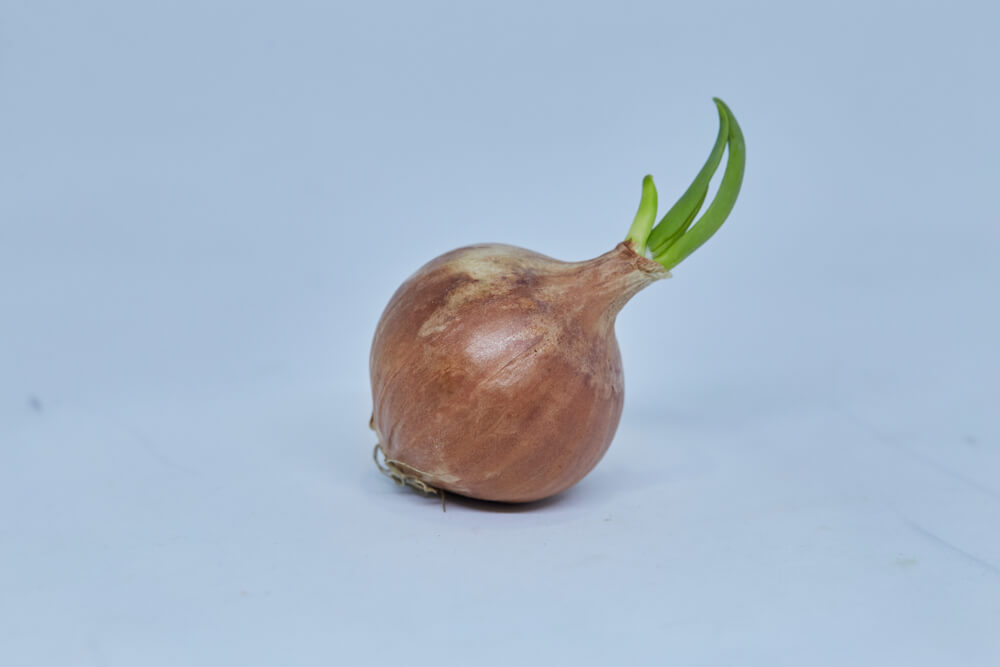Hey Ollie blog readers! We’re offering you an exclusive 60% OFF your starter box! Try now!
Onions are a staple in most culture’s cuisine. From French Onion Soup to Tandoori Chicken there are few savory recipes that don’t start out with some kind of onion. This can be a challenge for dog owners as this is a food you do not want your dog to eat.
Why are onions bad for dogs?
Onions contain compounds called disulfides and thiosulphates which can be toxic cats and dogs if they eat them. The toxicity causes conditions called hemolytic anemia, Heinz body anemia, and methemoglobinemia – all of which damage your dog’s red blood cells.
Every single part of an onion should be avoided by dogs. It does not matter if the onions are raw, cooked, fried or dried there is no safe way to share an onion with your dog. You should even avoid onion granules or onion salt that you find in the spice section of the grocery store. In addition to onions, other members of the allium family including leeks, garlic, shallots, and chives should be off-limits to your dog.
What kind of onions can dogs eat?
To be clear, this one is kind of a trick question but one that many dog owners will ask. You should avoid feeding your dog any type or part of the onion as well as other members of the onion family.
What to do if your dog has eaten onion
You don’t need to totally panic if your dog gets a small piece of onion. According to the American Kennel Club, “It only takes 100 grams of onion (about the size of a medium onion) per 20 kilograms of a dog’s weight to cause toxic effects, which means that a 45-pound dog would have to eat one medium-to-large-size onion to experience dangerous toxicity levels.
They also say that “Onion and garlic powders are even more potent than fresh onions. It is always a good idea to check the label of any human food we feed to our dogs, and onion powder should be in your list of “don’ts.” Popular seasoning blends for foods like chicken, steak and fish as well as many prepared sauces can contain garlic and onions in both the fresh and powdered forms.
If your dog has gotten into something with onions, take any remaining onion away and contact your vet immediately.
Annually, the ASPCA National Animal Poison Control Center in Urbana Illinois records only a handful to a dozen calls on onion toxicity and toxicity from its relatives in the garlic and chives. This is likely because with low-dose exposure (a bite or two of the offending ingredient) dogs might not develop symptoms that are severe for a vet to need to perform bloodwork for a diagnosis.
Even so, the best thing to do for a dog that has eaten too much onion is getting them to the vet for treatment ASAP. The doctor might induce vomiting if the onions were just eaten. Do not do this without consulting a vet first or under veterinary supervision.
Signs and symptoms of onion toxicity in dogs
Symptoms of onion toxicity include:
- Early-onset vomiting
- Diarrhea
- Breathlessness
- Lethargy
- Pale, yellow, or “muddy” colored gums
- Rapid breathing
- Elevated heart rate
- Discolored urine
Vomiting and diarrhea may occur as soon as the same day your pet has eaten onions (within 24 hours). It can take up to a week for the anemia symptoms including lethargy, breathlessness, rapid breathing, and elevated heart rate to appear. You do not want to wait until your pet has collapsed while taking a walk or playing to get them care. If you know that your dog has eaten onions or are fairly sure they have, do not wait until you see these symptoms to call the vet.
What is the treatment plan for a dog with onion toxicity?
The doctor may do a blood test to check for anemia. If your dog is positive, supportive care will be provided until your dog is making healthy red blood cells on their own. In the most severe cases of onion toxicity, your dog might need a blood transfusion to fully recover.
Don’t wait until you see symptoms in your dog, onions can be fatal. Getting treatment for your dog as quickly as possible increases the chances they will recover completely.
If you have a dog who has ever gotten into the onions or another forbidden food like grapes or macadamia nuts, you might feel a little paranoid about dog proofing your kitchen. These feelings are totally normal. Proactively keeping your pup away from onions and other foods that might make them sick will help keep your pup happy and healthy for many years to come.
The Ollie blog is devoted to helping pet parents lead healthier lives with their pups. If you want to learn more about our fresh, human-grade food, check out MyOllie.com.
Tagged As:

The nutrition your dog needs,
the food they want.

Enjoying our articles? Subscribe our Newsletters and get new articles directly to your inbox
You might also like
26 August 2025
4 MINS READ
Is Fresh Dog Food Safe?
If you’re thinking about switching your dog to a fresh food diet, you might be asking yourself: “Is fresh dog food safe?” It’s a smart question—because feeding fresh means you’re worki…
by Ollie Pets
26 August 2025
4 MINS READ
How Do I Know How Much Fresh Dog Food To Feed?
If you’ve switched your pup to fresh food, you’re probably wondering: “How much fresh dog food should I feed?” It’s not as simple as scooping kibble from a bag—fresh food is more nutri…
by Ollie Pets
26 August 2025
4 MINS READ
Do I Need To Cook Fresh Dog Food?
If you’ve just started exploring fresh dog food, you might be wondering: “Do I need to cook it?” or “Is it raw or already cooked?” It’s a common question, especially with so many pet f…
by Ollie Pets







